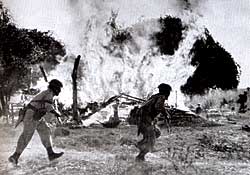 I was pulling out my gun again when our commanding officer, a short man, appeared and said, "Well done, Pun". He asked if I was all right, and I replied that everything was not all right. I told him that there were quite a lot of enemies inside the trench.
I was pulling out my gun again when our commanding officer, a short man, appeared and said, "Well done, Pun". He asked if I was all right, and I replied that everything was not all right. I told him that there were quite a lot of enemies inside the trench. He promised to send the flame-thrower, then vanished. On the lower side there was a British regiment which sent a flame-thrower. The flame even keeps burning on water, and if it falls on stone or iron it just turns them into soil. This weapon is best for trench warfare. The fire is so dangerous that if it falls on cloth or a piece of flesh, it just sticks to the skin.
Many enemies were roasted alive. Others fled through the passage that we had kept open. However, they didn't get far. Most only took a few steps and then fell down. The enemy troops were wiped out and we entered the town.
There we saw that the enemy troops and our own men in hand-to-hand combat, making it impossible to fire powerful weapons. Some of the soldiers started firing, while others began fighting with their hands like people under the influence of alcohol and a few were buried under stones and bricks. A few were struck with sticks or rifle butts. There was a sense of the confusion one sees during a festival.
This was followed by the harsh sound of a whistle blown by their commander. They stopped fighting and ran away. A whole lot of soldiers who had been taking shelter in the town started escaping by jumping into the river. The water carried about half of them away, but the rest managed to reach the other side. For a while the whole river was covered with human bodies. The civilians had already abandoned the town, and following the flight of the enemy soldiers, we captured the town.
In the evening we had an assembly, when respective commanders discussed strategies for the next day and also assessed who had fought well and which tactics had worked. Reports were collected on who did best in that day's capture of the town. Our platoon sergeant reported that except for two men, the rest of our platoon had been killed. He mentioned my name, and told them that I had done excellently during the siege of the bridge and also mentioned that I was the first to get into the enemy camp. The commander added that he was present at the time and had seen the event with his own eyes. A strong recommendation letter was written and dispatched to the war office.
On one day I had been assigned to bring the rations, which were carried by mules. When I arrived at the headquarters, a message had arrived from the war office. The clerk on duty took me aside and said, "Pun, one of the soldiers from your company has done an excellent job. I have collected the message. In all probability he will get a gallantry award." He gave me the message and told me to give it to the company. I glanced at it, and saw my name on it.
The following day, the commander sent for me. I saluted him, and then he patted me on the back and told me he had received the reply to his letter. "Well done!" he said, "You will receive a gallantry award, but I can't say right now what class of award it will be. Probably you will receive a very high order gallantry award." At the time, I was an ordinary rifleman. He told me that I had been elevated to the rank of sergeant and asked me to collect soldiers and form a section.
Our assault on the town had taken place on 23 June, 1944. I was awarded the Victoria Cross for our assault on the town that day. Captain Elmond also got a Victoria Cross. A few months later, I received the gallantry award in Delhi from Lord Louis Mountbatten, who was the viceroy of India and the supreme commander of the allied forces in Asia at the time.
The day after the fighting, the camp was cleaned and an inquiry of how many were killed in the assault took place. The attack on the town had cost us the lives of 11 British officers, 17 Gurkha officers and 773 others below the rank of jamadar (Gurkha lieutenant). After this, we reassembled at Dehara Dun and then went home on a two-month paid leave.


